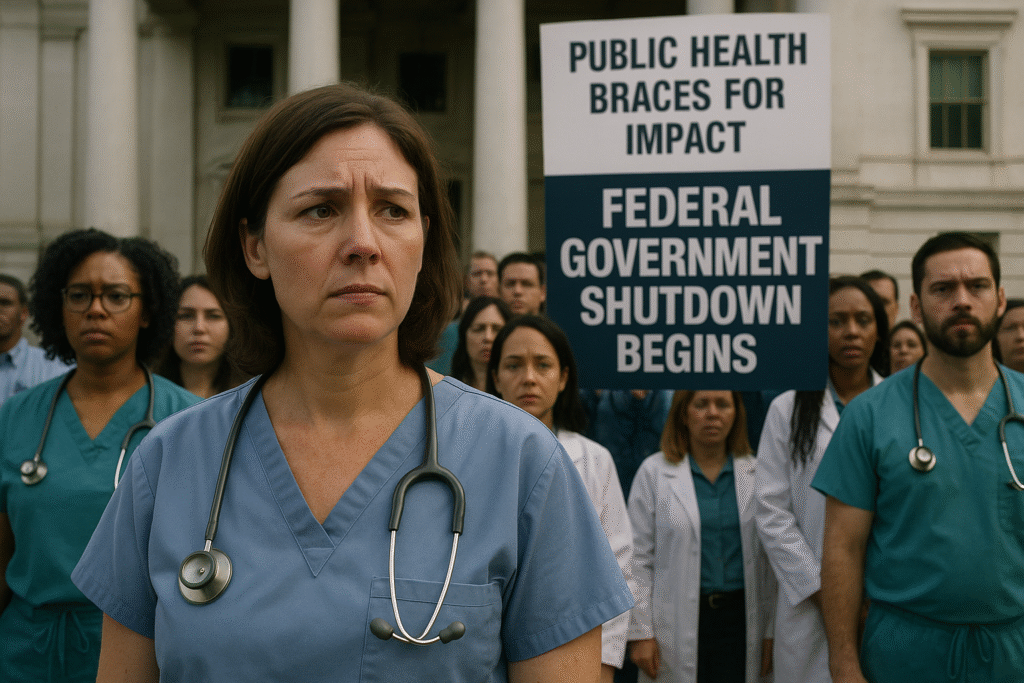By Harshit | October 4, 2025 | Washington, D.C. | 1:30 AM EDT
State and local health departments across the United States are preparing for disruptions caused by the federal government shutdown, which began Wednesday after Congress failed to reach a funding agreement. Officials warn that the closure could affect efforts to protect communities from disease outbreaks, monitor public health risks, and respond to emergencies.
“The shutdown will interfere with data collection and reporting to and from states, hospitals, and other facilities—data that allow state and federal partners to track, prevent, and treat respiratory virus diseases,” said Andrew Nixon, spokesperson for the U.S. Department of Health and Human Services (HHS). He noted that CDC communications and technical guidance to frontline programs may be limited, potentially hampering responses to urgent health threats.
Federal Support at Risk
Federal funds account for a significant portion of state and local public health budgets, covering staffing and critical programs. Lori Tremmel Freeman, CEO of the National Association of County and City Health Officials, expressed concern about the impact on staffing and resources.
“Federal staffing has already been reduced across public health, and a shutdown removes another layer of support for the system,” Freeman said. Only about 36% of CDC employees are considered essential and will continue working during the closure, according to HHS plans.
Officials warn that delays in federal support could affect disease surveillance, outbreak response, and public health guidance, especially as the country faces the respiratory virus season, hurricane season, and ongoing international health threats such as Ebola and mpox.
“We’re in this very vulnerable period where, if something happens and we need federal assistance, will it be available?” Freeman said.
State-Level Impacts
Some states report minimal disruption. The Utah Department of Health said all services will continue despite the federal shutdown. Other states, however, anticipate challenges. In Washington, approximately 50 public health employees funded partially or fully by federal dollars may face temporary layoffs or reduced work hours. Contractors and local health agencies could also be affected.
Much of the potential impact is tied to critical programs such as the Women, Infants, and Children (WIC) nutrition program, which supports more than 212,000 residents in Washington. Brittany Tybo, director of the state’s Office of Nutrition Services, emphasized the risk to families relying on food support, prenatal care, and immunization services.
“This federal shutdown will have a very real impact on families and communities in Washington state,” Tybo said. “All of these benefits are at risk, and the risk increases the longer the shutdown continues.”
Vaccines and Public Health Guidance
Staffing reductions may also slow communication between CDC experts and state or local health departments, particularly as the nation implements new vaccine policies. Earlier this month, the CDC’s Advisory Committee on Immunization Practices recommended changes to COVID-19 vaccine guidance, shifting to shared clinical decision-making. Local health departments may face difficulties in obtaining timely clarifications due to furloughed staff.
Adriane Casalotti, chief of government and public affairs at the National Association of County and City Health Officials, highlighted that disruptions in federal guidance could affect vaccine updates and policy implementation, leaving local health departments with less support for decision-making.
Preparing for Health Emergencies
Experts warn that public health agencies are entering a period of heightened vulnerability. Measles outbreaks continue across the country, traces of mpox appear in wastewater, and the hurricane season could strain emergency response systems. Without full federal support, state and local health departments may face delays in responding to these challenges.
“This is a time when federal resources play a critical role in protecting the nation’s health security,” Freeman said. “We can’t have these resources go silent.”
The duration of the shutdown will largely determine the severity of disruptions. Federal officials continue to monitor the situation, but public health leaders urge swift resolution to avoid gaps in disease surveillance, outbreak response, and essential health services.

